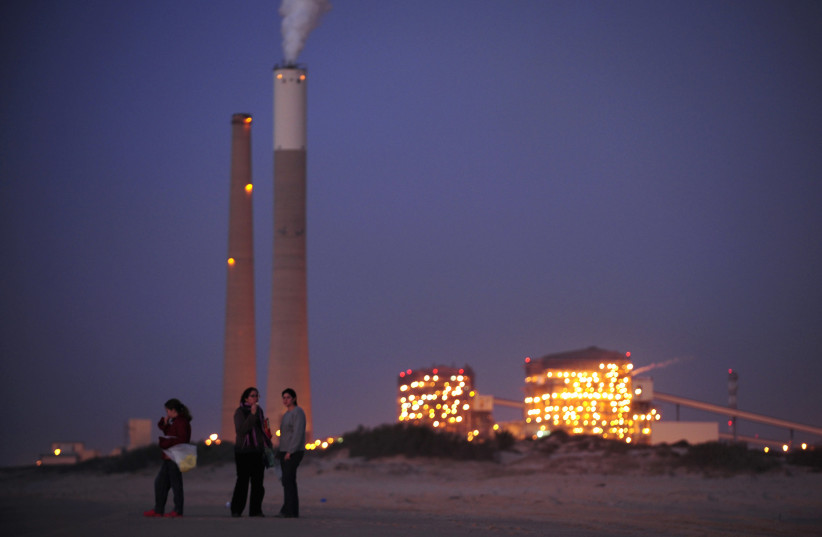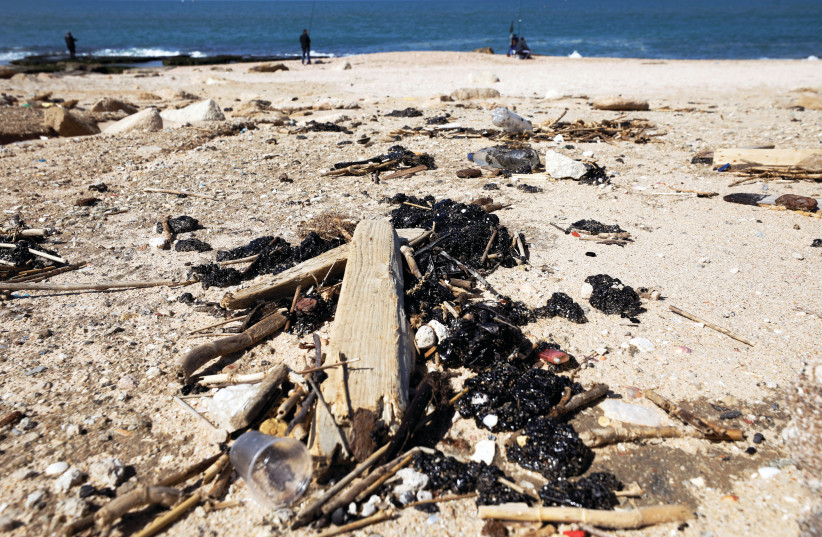The economic damages from air pollutants and greenhouse gasses alone were estimated at NIS 31 billion in 2018.
By MAAYAN JAFFE-HOFFMAN. MAY 2, 2023

(photo credit: AMIR COHEN/REUTERS)
The Environmental Protection Ministry failed to take action against businesses and factories that committed environmental violations, costing the country more than NIS 31 billion and leading to diseases and death among Israelis, according to a report by the state comptroller.
From 2013 to 2021, there was a 137% increase in the number of Israelis suffering from environmental harm, including 5,199 people between 2018 and 2022, the report said.
Comptroller Matanyahu Englman called on the ministry to “take extensive actions to improve its supervision and enforcement system” against those committing environmental violations. He recommended the ministry formulate a protocol for addressing existing challenges and improve the work processes of its enforcement bodies to promote increased administrative and criminal enforcement.
“Correcting these deficiencies is essential to properly deal with the kinds of environmental challenges that the country is facing and which are only expected to get worse in the future,” the report said.
Pollution by the comptroller’s definition includes contamination of air, water and soil, noise, radiation and more. The economic damage from air pollutants and greenhouse gases alone were estimated at NIS 31b. in 2018.
LUMPS OF tar mar the sand at a beach in Ashdod after an offshore oil spill polluted much of Israel’s Mediterranean shoreline last week. (credit: AMIR COHEN/REUTERS)
In 2019, the comptroller examined the Environmental Protection Ministry’s supervision and enforcement system and found many deficiencies. In this report, the comptroller said most of the shortcomings warned about then still needed to be corrected.
Environmental Protection Ministry monitoring and enforcement measures lacking
Specifically, the comptroller found that there has been a decrease in the supervision of factories, an insufficient level of administrative and criminal enforcement against violations, the absence of any effective protocol that would serve as the basis for the ministry’s supervision and enforcement activities and a structure that makes it difficult to carry out its supervision and enforcement duties in an optimal way.
Finally, the report said there are considerable gaps between the scope of the supervisory and enforcement tasks that need to be carried out and the personnel available to execute them.
The audit showed that no enforcement measures were taken in 60% (2,203 out of 3,674) of environmental violations recorded between 2018 and 2022. Moreover, out of the 16 regulations the Environmental Protection Ministry is meant to monitor and enforce, only nine were leveraged during the same period. There was a decline in the number of visits made by ministry personnel to factories in all districts by about 44% between 2018 and 2021. The result was a 137% increase in environmental violations between 2013 and 2021.
“The report reinforces the difficult feeling that prevails among the Israeli public: No one in Israel cares about their health due to exposure to environmental damage,” said Amit Bracha, executive director of Adam Teva v’Din. “In the past, the Environmental Protection Ministry claimed it did not have enough enforcement standards to take action against polluting factories. Now, this report makes clear: even when those standards exist, the ministry does not staff them.
“It is no wonder that the recent OECD report regarding carbon emissions and air pollution hotspots in Israel indicates that most Israelis are exposed to heavy and deadly air pollution in their lifetime,” Bracha added.
Data released by the World Health Organization shows Israel’s ambient air pollution concentrations are currently about 20 micrograms of atmospheric particulate matter with a diameter of less than 2.5 micrometers (PM2.5) per cubic meter of air, four times above the WHO limit of 5 µg/m3.
Jerusalem’s concentrations are around 70 µg/m3, equivalent to levels in developing countries like India.
“More Israelis die every year from air pollution than from terror, traffic accidents and domestic violence combined,” said Israeli-American environmentalist Yosef Abramowitz, a board member of the Israeli Union of Environmental NGOs and a leader of the President’s Climate Forum. He estimated that around 2,000 Israelis die annually due to environmental hazards.
“It is a silent killer,” Abramowitz said, noting that the three main culprits are preventable pollution from industry, transportation and energy, “whose policies serve special interests and not the common good.
“The comptroller report documents a dramatic decrease in oversight of polluting industries by the Environmental Protection Ministry.”
He highlighted several moves by the current administration that further harm the environment, including a Finance Ministry decision to end tax breaks on electric cars at a time when most of the developed world is focusing on the rapid adoption of electric vehicles to fight climate change, saving consumers money and reducing city air pollution.
Moreover, the Finance and Energy ministries are fighting an ambitious climate bill by the Environmental Protection Ministry to cut greenhouse gas emissions by 50% compared to 2015 by 2030 and transform the country into a net-zero economy by 2050. On Sunday, the Environmental Protection Ministry presented its bill to the Ministerial Committee on Legislation. However, it was deferred due to a lack of support and is supposed to be discussed again next week.
“Not only is the Environmental Protection Ministry not fulfilling its duty to operate with a heavy hand and zero tolerance toward the major polluting factories in Israel, but the entire Israeli government these days is behaving as if it has trapped the Israeli public in a vortex of pollution and exposure to diseases,” Bracha concluded.
“The government chooses not to promote carbon pricing against those polluting factories; subsidizes the increase in gasoline and coal prices; knowingly violates the Israeli Citizens’ Fund law that requires allocating budgets for the promotion of clean energy; abolishes the tax on disposable goods that should benefit the environment and the protection of public health; continues with ‘business as usual’ when it comes to burying 80% of the waste we produce, which is responsible for dozens of percent of greenhouse gas methane emissions; and knowingly works to thwart the passage of an advanced and ambitious climate law in Israel.”

